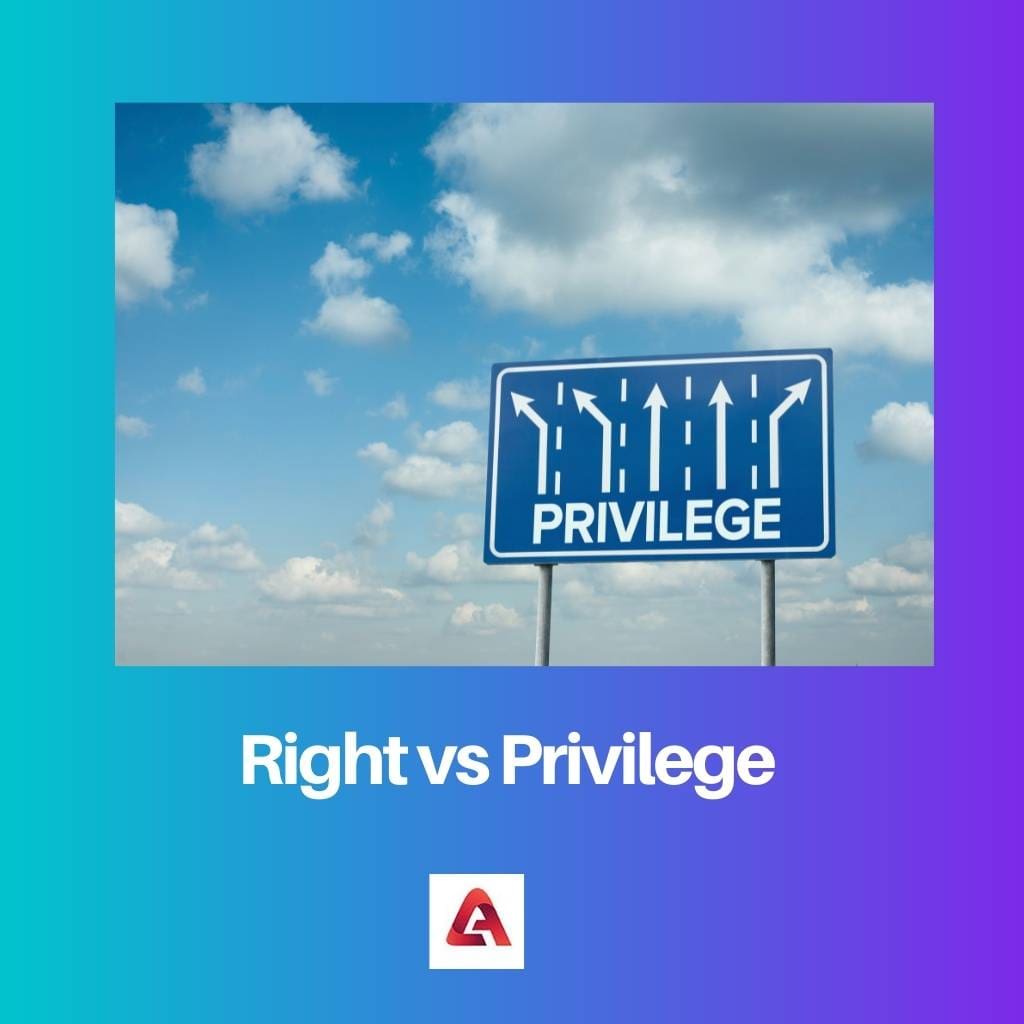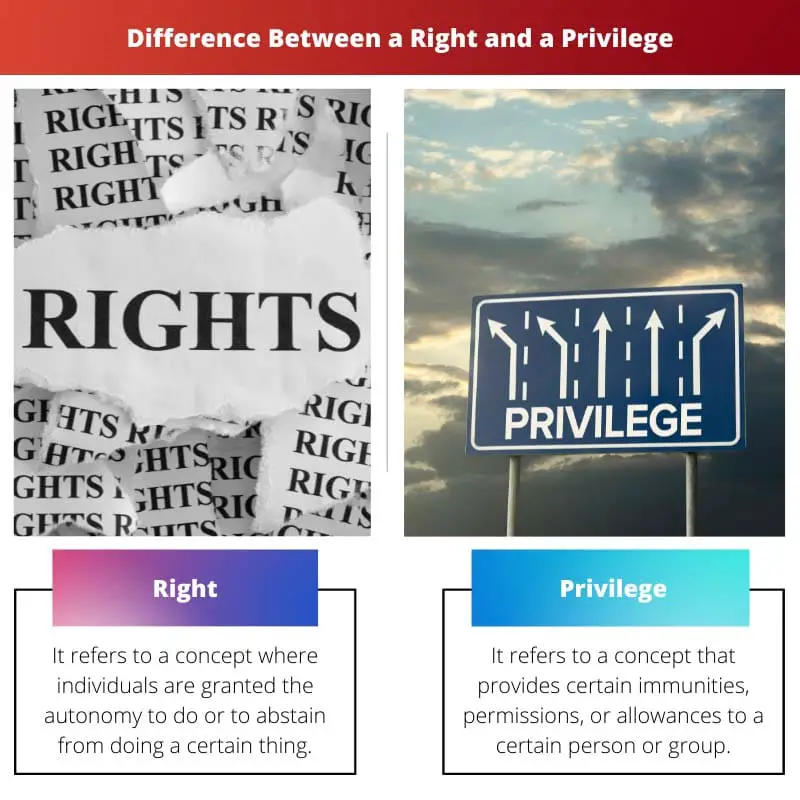A man is called a social animal, not just by looking at his lifestyle but by looking at his surroundings too.
The society in which humans live creates a complete aura for us and provides us with each and every necessity that a person can possibly have. However, when society increases with time, there arises a need for the maintenance of this human society.
Right and Privilege are two such elements that every righteous society should have in it to ensure the collective growth of the whole society and each and every person living in that society.
The concept of rights and privileges is common in almost all the democratic and republic countries of the world. This article will shed some light upon the distinctions that lie between these two concepts.
Key Takeaways
- A right is something that is inherently entitled to a person, while a privilege is something that is granted to a person.
- A right cannot be taken away, while a privilege can be revoked.
- A right applies universally, while a privilege applies to a specific group.
Right vs Privilege
The difference between A Right and A Privilege is that a Right is essentially granted by a certain form of justice. It can be prescribed by the law of the land or by the principles of natural justice. While on the other hand, a Privilege is a distinction given to a certain person or community or groups of people and can be given without reasonableness. Rights provide freedom, while privileges grant immunity to people.

A right is such a concept that it can be found in almost all the major parts of the world. It can be any type of right, such as a statutory right, constitutional right, and a right provided by one’s family.
However, at the major level, we talk about those rights that are framed with the intention of granting more autonomy or freedom to a person.
Talking about Privilege, it is not a generalized concept but rather a specific concept. Privilege is never applied to the whole members of a state or group. Rather it is granted to certain specific people only.
Now the question arises of what makes a person eligible for a privilege. The answer is quite simple that a privilege can be granted to a person based on his color, class, caste, sex, or other things.
Comparison Table
| Parameters of Comparison | Right | Privilege |
|---|---|---|
| Meaning | It refers to a concept where individuals are granted the autonomy to do or to abstain from doing a certain thing. | It refers to a concept that provides certain immunities, permissions, or allowances to a certain person or group of people based on their class, sex, caste, etc. |
| Granted to | It is granted to all individuals without discrimination. | It is granted to certain specific individuals only. |
| Granted by | Granted by the natural justice or by principles of equality | Granted by someone sitting in a higher position |
| Withdrawal | It cannot be withdrawn by anyone as its withdrawal shall amount to serious damage to equality and good conscience. | It can be revoked at any point in time by the authority that has granted it. |
| Interrelation | Most of the rights today, used to be privileges once. | Many privileges have turned into rights with the passage of time. |
| Examples | Right to vote, right to speech, right to education, etc. | Right not to be arrested during house proceedings (privilege given to the members of parliament) |
| Purpose | It is given to establish equality and non-discrimination in society. | It is given as a benefit to those who hold a higher rank. |
What is a Right?
People are granted rights because them being a member of a certain group or citizens of a certain country. These are the basic pillars of any democracy because they ensure that discrimination is canceled by providing equality and equal opportunities to all people.
It refers to a system where all individuals are granted the autonomy to do or abstain from doing a certain thing. Rights are granted by the principles of equity and good conscience.
They cannot be revoked or taken away as their withdrawal shall amount to serious damage to equality and good conscience.
However, there are certain rights that were considered privileges long ago, but they are now classified into basic human rights with the changes in time and society. Some crucial rights are-
- Right to life
- Right to food
- Right to speech
- Right to vote
- Right to privacy

What is a Privilege?
Privilege is a very distinguished and confusing concept. Mostly, people take it as a system where the people sitting in higher ranks get something good that the common people don’t.
However, this concept is not true. A privilege can be granted to anyone based on his conditions and status.
Talking about influential people. Privileges bring immunities for them.
Such as the immunity legislators granted to them for being a member of parliament. But when a privilege is granted to someone from a backward area, it brings equality and opportunity for those people.
One major example can be the concept of reservation.
However, there is one drawback attached to this concept that it can be revoked at any point in time by the authority that has granted it. As a privilege is provided by the government or the throne usually, it can be taken away without any justification.
But many privileges have turned into rights with the passage of time. For example- The right to vote used to be a privilege for certain people, but now it is termed a basic human right.

Main Differences Between a Right and a Privilege
- A Right is a concept where individuals are granted the autonomy to do or to abstain from doing a certain thing. In contrast, a privilege is a concept that provides certain immunities, permissions, or allowances to a certain person or group of people based on their class, sex, caste, etc.
- While a Right is granted to all individuals without discrimination, a privilege is granted to certain specific individuals only.
- A Right is given to establish equality and non-discrimination in society. While as far as Privilege is concerned, it is given as a benefit to those who hold a higher rank in certain aspects as compared to other people.
- A Right on one side cannot be withdrawn by anyone as its withdrawal shall amount to serious damage to equality and good conscience. In contrast, a Privilege can be snatched at any point from the recipient.
- Certain examples of rights are the right to vote, right to speech, right to education, etc. While the immunity given to legislators is an example of privilege.

- https://heinonline.org/hol-cgi-bin/get_pdf.cgi?handle=hein.journals/yjfem21§ion=9
- https://journals.sagepub.com/doi/abs/10.1177/1740774518803122

The article provides an in-depth analysis of the main differences between rights and privileges. Interestingly, it illustrates how over time, many privileges have transformed into rights in today’s society.
The discussion of how privileges can be revoked while rights are almost impossible to take away is particularly thought-provoking. It sheds light on the power dynamics within a society.
I concur with the insightful points made by the author. It’s crucial to understand the evolution of privileges to rights and how it impacts the current social dynamics.
The differentiation between rights and privileges in various contexts, such as the granting process and withdrawal, is meticulously deliberated in the article. It deepens the understanding of their roles in a society.
I echo your sentiments, the article’s exploration of the interrelation between rights and privileges over time underscores the dynamic nature of societal constructs.
The article effectively dissects the parameters of comparison between rights and privileges, imparting a holistic understanding of the core differences and historical implications of these concepts.
I found the article to be intellectually stimulating, especially in the way it traces the historical background of rights and privileges and their contemporary relevance.
The delineation of the purpose and examples of rights and privileges contributes to a comprehensive comprehension of the real-world implications of these fundamental concepts.
The comparison table presented in the article clearly outlines the distinctions between rights and privileges. It serves as a comprehensive reference point for any individual seeking clarity on this topic.
I completely agree, the article’s structured format of comparison makes it easier to comprehend the complexities surrounding rights and privileges.
The article provides an expansive view of the concept of rights and privileges, offering a comprehensive analysis from a historical context to contemporary societal implications.
The article’s focus on the purpose and examples of rights and privileges adds depth to the discourse surrounding these core societal components, highlighting their intrinsic role in social structures.
I wholeheartedly agree, the article’s analysis of the societal purpose of rights and privileges underscores the complexities and nuances within these concepts.
The detailed comparison of the meanings, granting process, and examples of rights and privileges elucidates the intricate nature of these concepts, providing a solid foundation for understanding.
I appreciate the comprehensive nature of the article. It has broadened my perspective on the evolution of privileges into rights and the crucial distinctions between these two concepts.
The emphasis on the transition of certain privileges into rights is particularly insightful, showcasing the evolving societal norms and values over time.
The article’s comprehensive comparison table serves as an exceptional reference point for understanding the nuances and critical distinctions between rights and privileges in various societal and legal contexts.
The structured and analytical approach employed in the article’s comparison table provides a lucid understanding of the complex interplay between rights and privileges.
I concur with your assessment. The article’s meticulous breakdown of the parameters of comparison enhances the clarity and comprehensiveness of the examination of rights and privileges.
The article effectively addresses the fundamental nature of rights and privileges, offering valuable insight into the concept of privilege and the criteria for granting privileges to specific individuals.
I found the section discussing the purpose of rights and privileges to be enlightening. It reflects how these concepts are integral to maintaining equality and non-discrimination in society.
The examination of the historical transition of privileges to rights offers a compelling narrative that reflects the evolution of societal norms and the dynamics of social justice over time.
I share your perspective. The article effectively weaves together historical transitions with contemporary implications, providing valuable insights into the progression of rights and privileges.